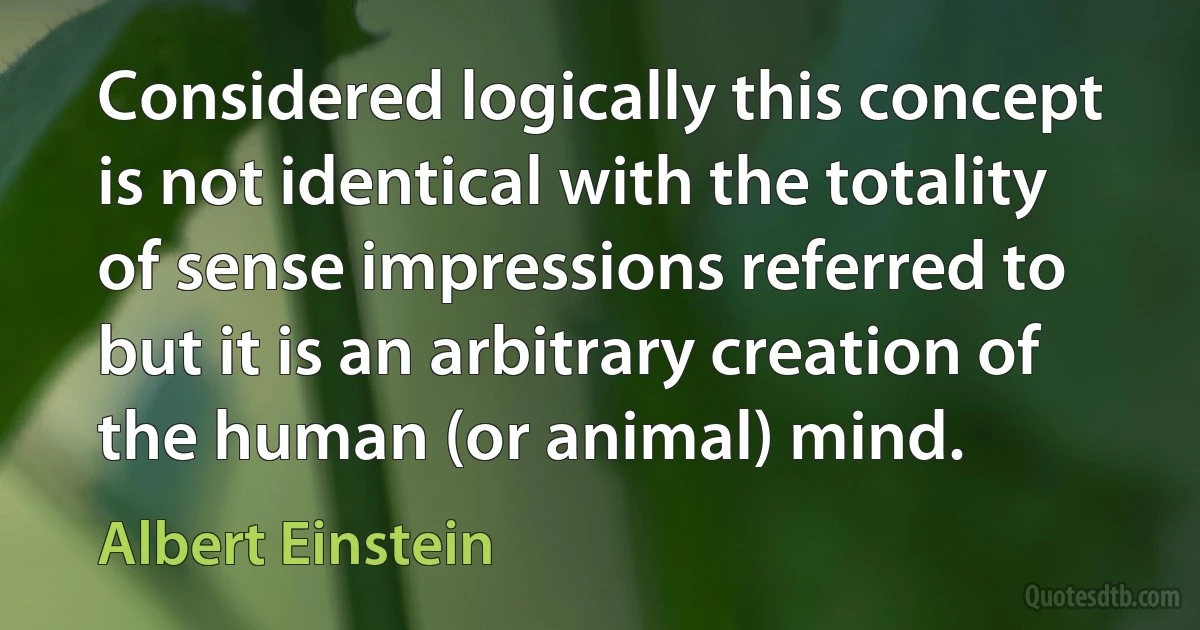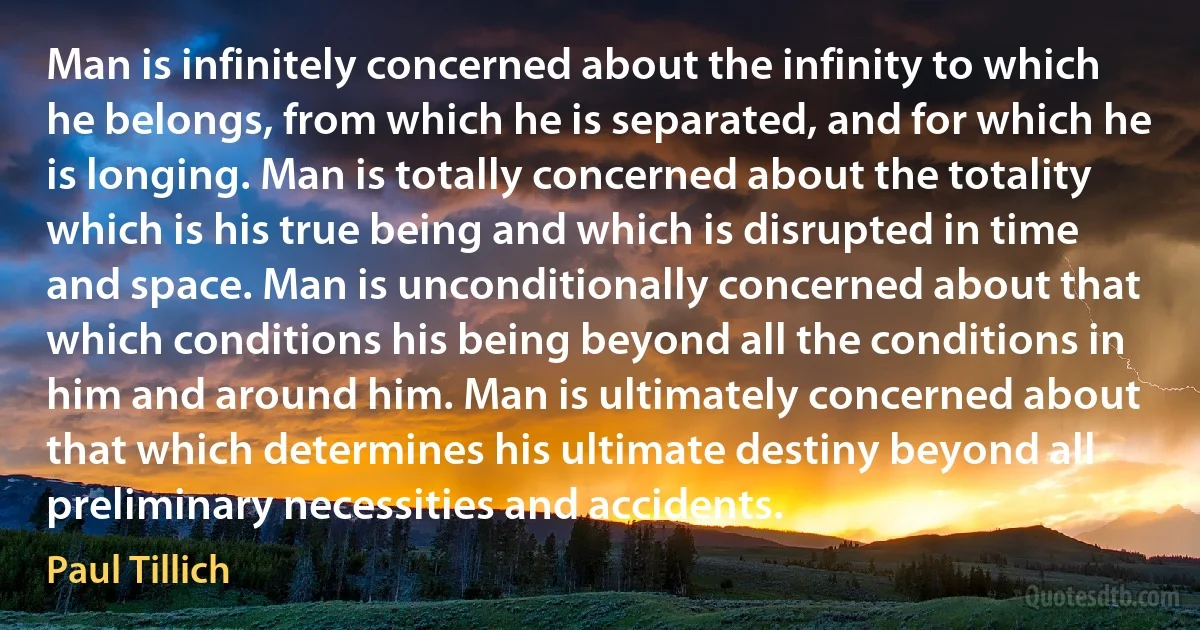Totality Quotes - page 7
Because psychoanalysis emerged as a medical specialty concerned with the healing of the sick, it focused its attention on the pathological processes arising from the disruption of the adaptive capacities, and this subject matter was taken to be the totality of significant information concerning the structure of the personality. The diagnosis and treatment of mental illness is, however, a poor basis for the empiricism which a basic science requires. Mental illness, when it is seen in terms of the symptoms and syndromes which come to the attention of the psychotherapist, presents a picture of the personality which is readily fragmented and distorted out of proportion.

Paul Rosenfels
What, exactly, is the cost of this inaction? Estimates of the total national cost of medical malpractice range from $20 billion to $45 billion annually. But this number hardly tells the whole story. There also is the more hidden cost of defensive medicine, including unnecessary testing and second opinions that send patients scurrying through processes that would not otherwise be ordered and deepen the financial burden of America's health care system by an estimated three percent of our country's total health care expenditures. Who ultimately pays these costs? Reckless doctors? Faceless insurance companies? Seldom mentioned, the totality of these expenses ultimately falls exclusively on the consumer, since each malpractice award translates ultimately to increased malpractice insurance premiums, which, in turn, translates to either higher health care costs, fewer physicians (with less competitive pricing pressure), or both.

Michael Johns
When I first heard the songs of Mario Ruiz Armengol I responded in awe at the totality of their musical expression. Mario's harmonic sense was one that I had never encountered in most Latin music; melodies which in themselves were distinctive and lingered in your mind after only one hearing; profound emotional content without being hyper-romantic in conception. Some of them seemed almost brooding in character, filled with a feeling of melancholia and reflecting the depth of his personality.

Clare Fischer
For some years now the activity of the artist in our society has been trending more toward the function of the ecologist: one who deals with environmental relationships. Ecology is defined as the totality or pattern of relations between organisms and their environment. Thus the act of creation for the new artist is not so much the invention of new objects as the revelation of previously unrecognized relation- ships between existing phenomena, both physical and metaphysical. So we find that ecology is art in the most fundamental and pragmatic sense, expanding our apprehension of reality.

Gene Youngblood
Somewhere along the line in human consciousness, there occurred self-consciousness. (When I use the word "self,” I don't mean that there is a self or a center there.) That consciousness separated man from the totality of things. Man, in the beginning, was a frightened being. He turned everything that was uncontrollable into something divine or cosmic and worshiped it. It was in that frame of mind that he created, quote and unquote, "God.” So, culture is responsible for whatever you are. I maintain that all the political institutions and ideologies we have today are the outgrowth of the same religious thinking of man. The spiritual teachers are in a way responsible for the tragedy of mankind.

Thomas Ligotti
Man is a divine manifestation, not in his accidentality and his fallen state, but in his theomorphism and his primordial and principial perfection. He is the "field of manifestation" of the intellect, which reflects the universal Spirit and thereby the divine Intellect; man as such reflects the cosmic totality, the Creation, and thereby the Being of God.

Frithjof Schuon
What animals and man have in common is, first of all, sensorial and instinctual intelligence, then the faculties of the senses, and finally basic feelings. What is proper to man alone is the intellect open to the Absolute; and also, owing to that very fact, reason, which extends the Intellect in the direction of relativity; and consequently it is the capacity for integral knowledge, for sacralization, and for ascension. Man shares with animals the wonder of subjectivity − but strangely a wonder that is not understood by the evolutionists; however, the subjectivity of animals is only partial, whereas that of man is total; the sense of the Absolute coincides with totality of intelligence.

Frithjof Schuon
The fundamental solution to the problem of the credibility of religious axioms, and consequently the quintessence of the proofs of God, lies in the ontological correspondence between the macrocosm and the microcosm, that is, in the fact that the microcosm has to mirror the macrocosm; in other words, the subjective dimension, taken in its totality, coincides with the objective dimension, from which the religious and metaphysical truths derive in the first place. What matters is to actualize this coincidence, and this is what Revelation does, in principle or de facto, by awakening, if not always direct intellection, at least the indirect intellection which is faith; credo ut intelligam.

Frithjof Schuon
Authentic existence involves exaltation, sensitivity to the holy, awareness of indebtedness.
Existence without transcendence is a way of living where things become idols and idols become monsters.
Denial of transcendence contradicts the essential truth of being human. Its roots can be traced either to stolidity of self-contentment or to superciliousness of contempt, to moods rather than to comprehensive awareness of the totality and mystery of being.
Denial of transcendence which claims to unveil the truth of being is an inner contradiction, since the truth of being is not within being or within our consciousness of being but rather a truth that transcends our being.

Abraham Joshua Heschel
If I were not an atheist, I would believe in a God who would choose to save people on the basis of the totality of their lives and not the pattern of their words. I think he would prefer an honest and righteous atheist to a TV preacher whose every word is God, God, God, and whose every deed is foul, foul, foul.
I would also want a God who would not allow a Hell. Infinite torture can only be a punishment for infinite evil, and I don't believe that infinite evil can be said to exist even in the case of Hitler. Besides, if most human governments are civilized enough to try to eliminate torture and outlaw cruel and unusual punishments, can we expect anything less of an all-merciful God?
I feel that if there were an afterlife, punishment for evil would be reasonable and of a fixed term. And I feel that the longest and worst punishment should be reserved for those who slandered God by inventing Hell.

Isaac Asimov
Though Dogma and theology are always intimately related and can never be separated, yet they are never entirely of the same stuff. Dogma is a vast domain which theology will never wholly exploit. There is always infinitely more in Dogma, considered in its concrete totality, that is to say, in the very Object of divine revelation, than in this "human science of revelation", in this product of analysis and rational elaboration which theology always is. The latter, in its very truth, will always-and all the more in that it will always be rationally formulated-be inadequate for Dogma; for it is indeed the explanation of it, but not the fulness. This weakness is congenital. True theology knows that. It does not confuse the orders.

Henri de Lubac
Is science really gaining in its assault on the totality of the unsolved? As science learns one answer, it is characteristically true that it also learns several new questions. It is as though science were working in a great forest of ignorance, making an ever larger circular clearing within which, not to insist on the pun, things are clear... But as that circle becomes larger and larger, the circumference of contact with ignorance also gets longer and longer. Science learns more and more. But there is an ultimate sense in which it does not gain; for the volume of the appreciated but not understood keeps getting larger. We keep, in science, getting a more and more sophisticated view of our essential ignorance.

Warren Weaver
The absolute idea is the subject in its final form, thought. The otherness and negation is the object, being. The absolute idea now has to be interpreted as objective being. Hegel's Logic thus ends where it began, with the category of being. This, however is a different being that can no longer be explained thought he concepts applied in the analysis that opened the Logic. For being now is understood in its notion that is, as a concrete totality wherein all particular forms subsist as the essential distinctions and relations of on comprehensive principle. Thus comprehended, being is nature, and dialectical thought passes on to the Philosophy of Nature. P. 165-166.

Herbert Marcuse
Everyone who achieves strives for totality, and the value of his achievement lies in that totality-that is, in the fact that the whole, undivided nature of a human being should be expressed in his achievement. But when determined by our society, as we see it today, achievement does not express a totality; it is completely fragmented and derivative. It is not uncommon for the community to be the site where a joint and covert struggle is waged against higher ambitions and more personal goals. ... The socially relevant achievement of the average person serves in the vast majority of cases to repress the original and nonderivative, inner aspirations of the human being.

William D. Tammeus
If...Berg departs so radically from tradition, through his substitution of a symmetrical partitioning of the octave for the asymmetrical partionings of the major/minor system, he departs just as radically from the twelve-tone tradition that is represented in the music of Schoenberg and Webern, for whom the twelve-tone series was always an integral structure that could be transposed only as a unit, and for whom twelve-tone music always implied a constant and equivalent circulation of the totality of pitch classes.

Alban Berg
A plant, an animal, the regular order of nature - probably also the disposition of the whole universe - give manifest evidence that they are possible only by means of and according to ideas; that, indeed, no one creature, under the individual conditions of its existence, perfectly harmonizes with the idea of the most perfect of its kind - just as little as man with the idea of humanity, which nevertheless he bears in his soul as the archetypal standard of his actions; that, notwithstanding, these ideas are in the highest sense individually, unchangeably, and completely determined, and are the original causes of things; and that the totality of connected objects in the universe is alone fully adequate to that idea.

Immanuel Kant
I want to talk about our common responsibilities in the face of a common danger. The events of recent weeks may have helped to illuminate that challenge for some; but the dimensions of its threat have loomed large on the horizon for many years. Whatever our hopes may be for the future - for reducing this threat or living with it - there is no escaping either the gravity or the totality of its challenge to our survival and to our security - a challenge that confronts us in unaccustomed ways in every sphere of human activity.
This deadly challenge imposes upon our society two requirements of direct concern both to the press and to the President - two requirements that may seem almost contradictory in tone, but which must be reconciled and fulfilled if we are to meet this national peril. I refer, first, to the need for a far greater public information; and, second, to the need for far greater official secrecy.

John F. Kennedy
![[Overall level questions involved an] understanding of the deep structure of the data being presented in their totality, usually comparing trends and seeing groupings. (Jacques Bertin)](https://cdn.quotesdtb.com/img/quotes_images_webp/58/jacques-bertin-comparing-datum-511258.webp)


